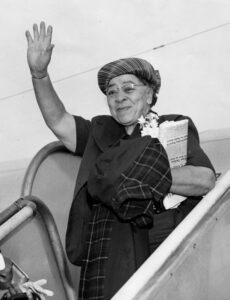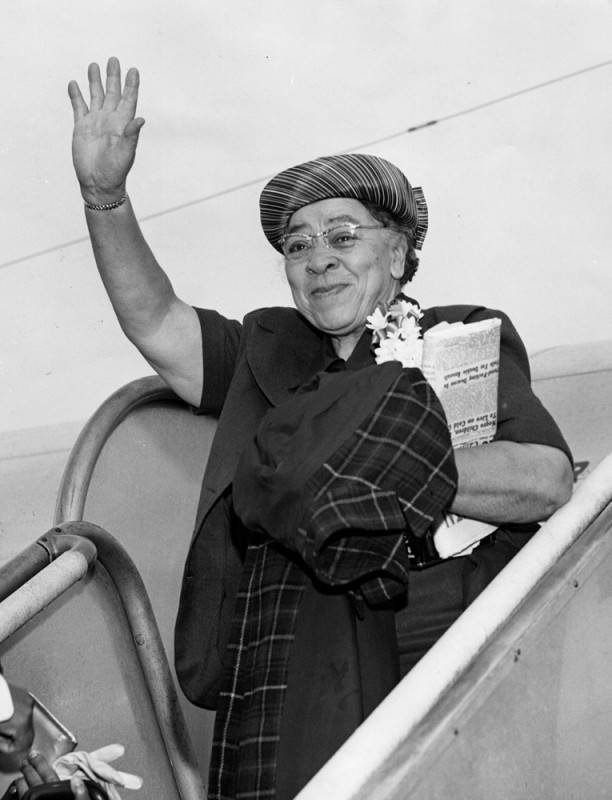Charlotta Bass and Her Relationship with Prominent Labor Organizers
In the 1920s and 1930s, Bass used The California Eagle to report on the struggles of Black workers, especially in industries where labor exploitation and racial discrimination were rampant.
Charlotta Bass, a pioneering journalist, civil rights activist, and political trailblazer, is often remembered for her unwavering dedication to justice and equality. As the editor and publisher of The California Eagle, one of the longest-running African American newspapers in the United States, Bass used her platform to advocate for racial equality, women’s rights, and economic justice. Among her many alliances, her close relationships with labor organizers such as A. Philip Randolph and Ron Dellumsstand out as significant milestones in the history of labor and civil rights in America.
A. Philip Randolph: Champion of Black Labor Rights
A. Philip Randolph was one of the most prominent labor leaders of the 20th century, renowned for his leadership of the Brotherhood of Sleeping Car Porters (BSCP), the first predominantly African American labor union. His fight for fair wages and better working conditions for Black porters in the Pullman Company intersected with Charlotta Bass’s advocacy for economic and racial justice through her work in journalism.
In the 1920s and 1930s, Bass used The California Eagle to report on the struggles of Black workers, especially in industries where labor exploitation and racial discrimination were rampant. Through her newspaper, Bass became a vocal supporter of Randolph’s efforts to organize African American workers, understanding that economic justice was inextricably linked to racial equality. The Eagle published many stories highlighting Randolph’s organizing efforts, including the BSCP’s fight for recognition.
Their collaboration extended beyond labor rights to a broader political agenda. In 1941, Randolph proposed a March on Washington to protest racial segregation in the defense industry, an idea that Bass strongly supported through her newspaper and public engagements. The planned march gained significant traction and prompted President Franklin D. Roosevelt to issue Executive Order 8802, banning discrimination in the defense industry and government jobs. This victory was a testament to the combined power of journalism and organizing—Bass and Randolph’s shared belief in using their platforms to drive systemic change. During Randolph’s speech at the 1963 March on Washington, he said,
“And we know that we have no future in a society in which 6 million black and white people are unemployed and millions more live in poverty. Nor is the goal of our civil rights revolution merely the passage of civil rights legislation. Yes, we want all public accommodations open to all citizens, but those accommodations will mean little to those who cannot afford to use them. Yes, we want a Fair Employment Practice Act, but what good will it do if profit-geared automation destroys the jobs of millions of workers black and white?”
The Fight for Economic Justice
The shared commitment to economic justice was a cornerstone of Bass’s relationship with prominent labor organizers. As early as the 1920s, Bass recognized that Black workers in California and across the nation were being denied fair wages and dignified working conditions. She saw labor unions as critical tools in empowering African American workers, and her newspaper frequently championed their causes.
In addition to supporting the Brotherhood of Sleeping Car Porters, Bass forged relationships with other prominent labor organizers who were advocating for the rights of Black and working-class people. Figures like C.L. Dellums, a key figure in the labor movement and the uncle of future Congressman Ron Dellums, also found an ally in Bass. C.L. Dellums worked alongside Randolph in the BSCP and was instrumental in organizing Black railway workers. Bass’s support for their work ensured that their voices were amplified beyond the labor movement, reaching broader audiences through The California Eagle.
Her newspaper often covered labor strikes, wage protests, and efforts to combat job discrimination, shedding light on how Black workers were consistently relegated to the most menial and dangerous jobs. In editorials like “Inside Story on the RR Strike,” she broke down labor strikes impacting the country,
“It is not a matter of the New Deal or the Old Deal that concerns us at the president. It is the killing of the OPA, of price control, which means the hiking of rents and the increase in food costs.”
Bass’s coverage of labor issues was critical in shaping public opinion and bolstering the momentum of labor movements at a time when mainstream newspapers often ignored or maligned such efforts.
Ron Dellums: A New Era of Labor and Civil Rights
Ron Dellums, the nephew of C.L. Dellums, represents the next generation of labor-oriented civil rights activism with whom Charlotta Bass would cross paths. A Berkeley City Council member and later a U.S. Congressman, Dellums embodied the spirit of labor activism that Charlotta Bass had supported for decades. His career was shaped by a commitment to economic and racial justice, with deep roots in labor organizing.
As Dellums transitioned into national politics, his advocacy for workers’ rights, fair wages, and social justice echoed the principles Bass had long championed. In the 1960s and 1970s, Dellums became a powerful voice in Congress for progressive causes, including workers’ rights, anti-war activism, and civil rights legislation. In a 2015 speech, Dellums explained his activism approach:
“Suppose everyone—because I believe that the movement to end the war in Vietnam ultimately became the largest and most powerful movement in the country. But when the war in Vietnam ended, many of the people went home and left us to fight racism, poverty, hunger, disease, homelessness, helplessness—went home. And my great lament in my life has been: What would have happened in this country and in this world if people had heard Martin Luther King and said, “Now that we’ve ended the war in Vietnam, let’s get on with dealing with other forms of injustice”? What would the world look like?”
While their political careers did not overlap significantly in a personal sense—Bass had retired from active politics by the time Dellums rose to prominence—Dellums stood on the shoulders of the labor movement that Bass had helped promote.
Bass’s mentorship of young activists, and her dedication to promoting labor justice through media, laid the foundation for the next generation of Black leaders like Dellums. Her journalistic legacy influenced politicians and labor organizers alike, as they continued the fight for the causes she championed, from fair wages to comprehensive civil rights protections.
Bass’s Intersectional Approach to Labor and Gender Equality
Charlotta Bass’s work did not stop at promoting labor rights; she also understood the intersectionality of race, class, and gender. In addition to advocating for Black workers, Bass was a staunch supporter of women’s rights, particularly working-class women who faced double discrimination based on both race and gender.
In The California Eagle, Bass chronicled the work and initiatives of the National Council of Negro Women (NCNW), a civil rights organization led by Mary McLeod Bethune that focused on advancing the rights of African American women, particularly in the workplace.
She also used her newspaper to promote the causes of women in labor, highlighting their struggles in a male-dominated workforce and amplifying the voices of women labor organizers who were often marginalized within the movement. In her editorial, “Things to Come: 1943,” she wrote:
“Greatest of the changes taking place in Los Angeles is the stupendous shift in the position of Negro women. Those who were thrice persecuted: they were poor; they were women; and they were black – are now catapulted into a position of strategic leadership for the whole city’s Negro population.”
In this respect, Bass’s relationship with labor organizers like A. Philip Randolph and Ron Dellums extended beyond economic justice. She sought to create a more inclusive labor movement that addressed the unique struggles of Black women, advocating for policies that protected women workers from sexual harassment, wage discrimination, and unsafe working conditions.
Conclusion: A Lifelong Commitment to Labor and Civil Rights
Charlotta Bass’s relationship with prominent labor organizers like A. Philip Randolph and Ron Dellums reflects a deep and sustained commitment to labor and civil rights. Through her work as a journalist and activist, Bass used The California Eagle to spotlight the struggles of Black workers and to amplify the voices of labor leaders who were fighting for economic justice. Her partnership with labor organizers was instrumental in advancing key victories, from the desegregation of the defense industry to the broader civil rights protections that would come in the mid-20th century.
While Bass is often celebrated for her political activism and pioneering work in journalism, her contributions to the labor movement are equally significant. She understood that the fight for racial equality could not be separated from the fight for economic justice, and she forged deep relationships with labor leaders who shared her vision for a more just and equitable society. Through her work, Bass helped to shape a labor movement that was more inclusive, intersectional, and committed to the full equality of all people.


